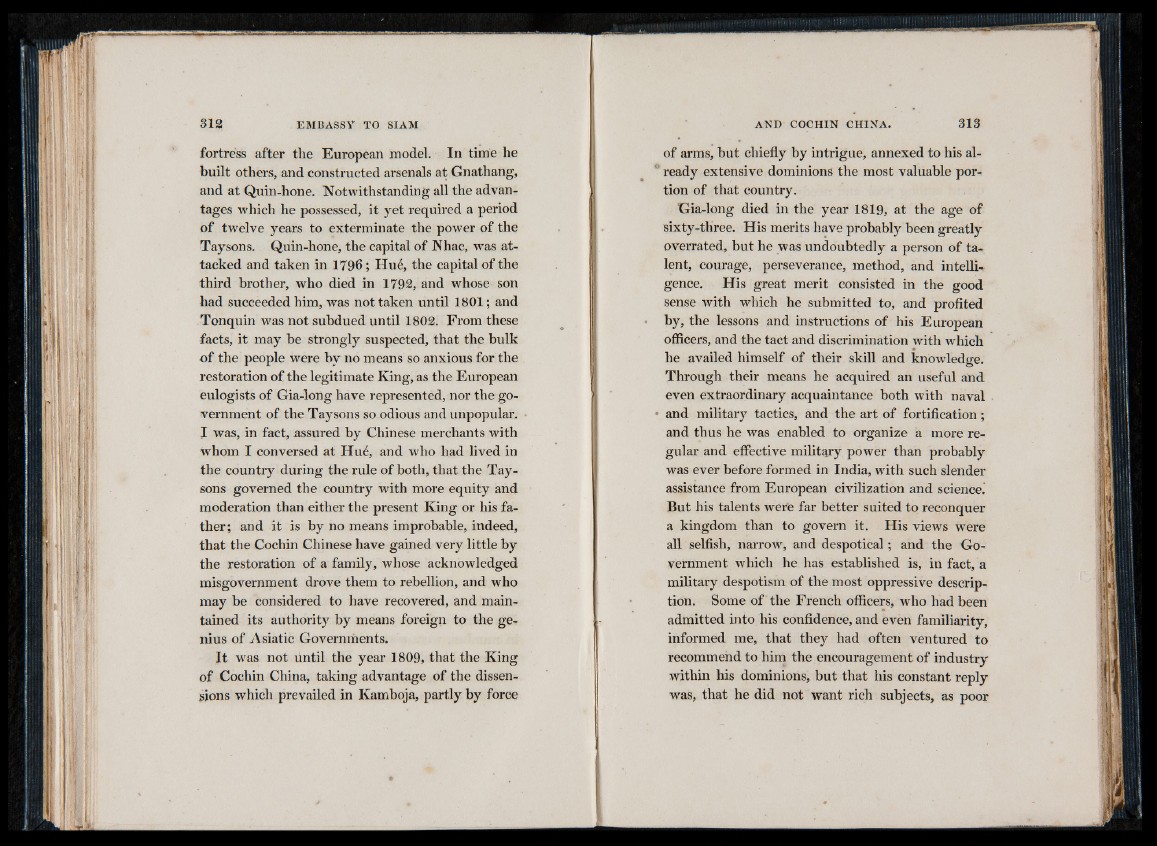
fortress after the European model. In time he
built others, and constructed arsenals at Gnathang,
and at Quin-hone. Notwithstanding all the advantages
which he possessed, it yet required a period
of twelve years to exterminate the power of the
Taysons. Quin-hone, the capital of Nhac, was attacked
and taken in 1796; Hué, the capital of the
third brother, who died in 1792, and whose son
had succeeded him, was not taken until 1801; and
Tonquin was not subdued until 1802. From these
facts, it may be strongly suspected, that the bulk
o f the people were by no means so anxious for the
restoration of the legitimate King, as the European
eulogists of Gia-long have represented, nor the government
of the Taysons so odious and unpopular.
I was, in fact, assured by Chinese merchants with
whom I conversed at Hué, and who had lived in
the country during the rule of both, that the Taysons
governed the country with more equity and
moderation than either the present King or his father;
and it is by no means improbable, indeed,
that the Cochin Chinese have gained very little by
the restoration of a family, whose acknowledged
misgovernment drove them to rebellion, and who
may be considered to have recovered, and maintained
its authority by means foreign to the genius
of Asiatic Governments.
I t was not lintil the year 1809, that the King
of Cochin China, taking advantage of the dissensions
which prevailed in Kamboja, partly by force
of arms, but chiefly by intrigue, annexed to his al-
° ready extensive dominions the most valuable portion
of that country.
Gia-long died in the year 1819, at the age of
sixty-three. His merits have probably been greatly
overrated, but he was undoubtedly a person of talent,
courage, perseverance, method, and intelligence.
His great merit consisted in the good
sense with which he submitted to, and profited
by, the lessons and instructions of his European
officers, and the tact and discrimination with which
he availed himself of their skill and knowledge.
Through their means he acquired an useful and
even extraordinary acquaintance both with naval
• and military tactics, and the art of fortification;
and thus he was enabled to organize a more regular
and effective military power than probably
was ever before formed in India, with such slender
assistance from European civilization and science.
But his talents were far better suited to reconquer
a kingdom than to govern it. His views were
all selfish, narrow, and despotical; and the Government
which he has established is, in fact, a
military despotism of the most oppressive description.
Some of the French officers, who had been
admitted into his confidence, and even familiarity,
informed me, that they had often ventured to
recommend to him the encouragement of industry
within his dominions, but that his constant reply
was, that he did not want rich subjects, as poor